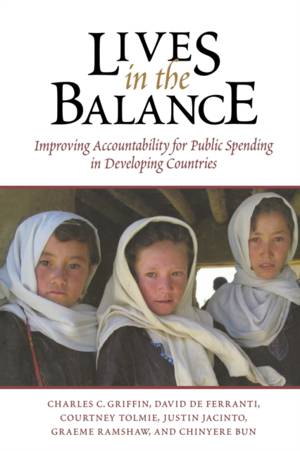
- Afhalen na 1 uur in een winkel met voorraad
- Gratis thuislevering in België vanaf € 30
- Ruim aanbod met 7 miljoen producten
- Afhalen na 1 uur in een winkel met voorraad
- Gratis thuislevering in België vanaf € 30
- Ruim aanbod met 7 miljoen producten
Lives in the Balance
Improving Accountability for Public Spending in Developing Countries
Charles C Griffin, David Ferranti, Courtney TolmieOmschrijving
Because of its potential impact, and, in some cases, the harm it has brought, foreign aid is under the microscope. Donor countries, who don't want simply to give money away; recipient nations, who need to make the most of what they have and get; and analysts, policymakers, and writers are all scrutinizing how much is spent and where it goes. Perhaps more important, aid is only a small part of what developing country governments spend. Their own resources finance 80 percent or more of health and education spending except in the most aid-dependent countries. Lives in the Balance investigates a vital aspect of this landscape--how best to ensure that public spending, including aid money, gets to the right destination.
The development of democratic institutions and the spread of cheap communications technology in developing countries make it possible for the ""demand-side""--citizens and civil society institutions--to advocate for improved transparency, stronger accountability, better priorities, reduced corruption, and more emphasis on helping the poor. Securing real reform will depend not only on knowledge of how the recipient government operates, but also how to work with partner entities--the media, the private sector, other organizations, and legislators--to raise awareness and compel change.
"Specificaties
Betrokkenen
- Auteur(s):
- Uitgeverij:
Inhoud
- Aantal bladzijden:
- 174
- Taal:
- Engels
Eigenschappen
- Productcode (EAN):
- 9780815732891
- Verschijningsdatum:
- 23/07/2010
- Uitvoering:
- Paperback
- Formaat:
- Trade paperback (VS)
- Afmetingen:
- 155 mm x 224 mm
- Gewicht:
- 294 g

Alleen bij Standaard Boekhandel
Beoordelingen
We publiceren alleen reviews die voldoen aan de voorwaarden voor reviews. Bekijk onze voorwaarden voor reviews.











